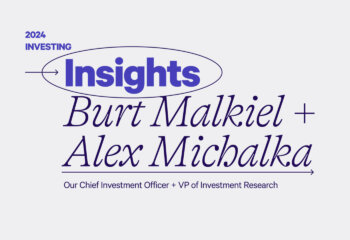Note: As of November 3, 2023, the Wealthfront Cash Account has a 5.00% APY. Read more about it here .
Over the last few months, we’ve had to lower the interest rate on the Wealthfront Cash Account each time the Federal Reserve lowered the target fed funds rate. This may lead you to assume the only time your rate will decrease is when the Federal Reserve makes a rate cut announcement. Unfortunately this is not the case – the interest rate on your cash account can also be impacted by the effective fed funds rate, which has seen considerable and historically unusual volatility in recent weeks. In this post, we’ll explain what exactly this rate is and how it might impact the interest rate on your cash account.
It starts with the Federal Reserve
The Federal Reserve meets eight times a year to determine the target fed funds rate, which is set as a range. At the last meeting in September, the target range was lowered by 0.25% to between 1.75% and 2.00%. This target rate influences nearly every financial institution, and a rate change impacts consumers almost immediately. As we discussed in a previous post, when the Federal Reserve decides to cut the target fed funds rate like we saw on July 31 and Sept 18, the interest rates paid to you from high yield savings accounts and Certificate of Deposit (CD) go down, too. The silver lining here is that the interest rate on loans, like mortgages or student loans, go down as well.
What is the federal funds rate and what is it used for?
As part of its role in managing risk in the financial markets, the Federal Reserve requires banks to have a certain amount of federal funds (cash held at Federal Reserve Banks) each night. Day to day, some banks will have more than the amount of funds required by regulators, while other banks will not have enough. The fed funds rate is the rate that banks with surpluses are willing to loan funds to banks without enough to meet their nightly reserve requirement. While the Federal Reserve sets a target range for the fed funds rate through the Fed meetings, that’s all it is – a target. In reality, the federal funds rate is determined by supply and demand for borrowing between banks and fluctuates daily.
However, the Federal Reserve can further influence the fed funds rate by taking various monetary actions, such as buying and selling US government securities in the open market. If the Federal Reserve buys securities from banks, banks will in effect have more cash on hand from selling their securities, which means they will have more funds to lend to other banks. And if there’s an increased supply of cash in the system, then the fed funds rate should fall.
How does this impact the rate you earn from the Wealthfront Cash Account?
As we’ve explained before, the rate we’re able to pay on the Wealthfront Cash Account is based on the rates we receive from Wealthfront’s partner banks — the banks where we place your cash account funds. The rate from our partner banks is based on a set premium over the previous night’s effective fed funds rate, which is the average rate that banks lent and borrowed funds to each other the prior night. This means a decrease in the effective fed funds rate will lead to a decrease in the rate we receive from our partner banks.
Our regulators do not allow us to ever pay a rate higher than what we receive from our partner banks. When it comes to setting our rate, we aim to pass as much interest on to clients as possible, while offering a stable rate. To do so, we maintain a small rate cushion so you don’t have to experience the daily volatility of effective fed funds rate. The size of the cushion is meant to handle almost all expected rate volatility based on historical experience. However we would have to lower our rate in the unlikely scenario where the effective fed funds rate were to drop by more than the amount of our cushion. For example, if tomorrow the effective fed funds rate were to drop such that the rate we receive from our partner banks is 2.06%, we would have to decrease our rate from 2.07% to 2.06%.
As difficult as it is to predict Fed announcements around rate decreases, it’s even more difficult to forecast the day to day swings in the effective fed funds rate. While we geek out about the details of monetary policy, we don’t expect you to. But it’s important to us to be as transparent as possible about what’s happening in the background with your money.
With an interest rate of 2.07%, the Wealthfront Cash Account helps you earn 20x the average of what you’d earn with traditional financial institutions*. And at any interest rate, you enjoy unlimited free transfers, pay no fees, and your cash is covered by FDIC insurance for up to $8 million through our partner banks. Our consolidated financial ecosystem makes it simple for you to manage your savings and investments from one place. Your cash is still growing, and we’re always looking for new ways to pass along more interest to you.
Disclosure
*Bankrate national industry average savings rate as of September 20, 2019.
This blog is powered by Wealthfront Software LLC (“Wealthfront”) and has been prepared solely for informational purposes only. Nothing in this communication should be construed as an offer, recommendation, or solicitation to buy or sell any security or a financial product. Any links provided to other server sites are offered as a matter of convenience and are not intended to imply that Wealthfront or its affiliates endorses, sponsors, promotes and/or is affiliated with the owners of or participants in those sites, or endorses any information contained on those sites, unless expressly stated otherwise.
The Annual Percentage Yield (APY) for the Cash Account is as of a specific date, and may change at any time. The APY for the Wealthfront Cash Account represents the weighted average of the APY on the aggregate deposit balances of all clients at the program banks. Deposit balances are not allocated equally among the participating program banks. Cash Account is offered by Wealthfront Brokerage. Neither Wealthfront Brokerage nor its affiliates is a bank. Wealthfront Brokerage conveys Cash Account funds to depository institutions that accept and maintain such deposits. The cash balance in the Cash Account is swept to one or more banks (the “Program Banks”) where it earns a variable rate of interest and is eligible for FDIC insurance. FDIC insurance is not provided until the funds arrive at the Program Banks. While funds are at Wealthfront, before they are swept to the program banks, they are subject to SIPC’s protection limit of $250,000 for cash. FDIC insurance coverage is limited to $250,000 per qualified customer account per banking institution. Wealthfront Brokerage uses more than one Program Bank to ensure FDIC coverage of up to $8 million for your cash deposits. For more information on FDIC insurance coverage, please visit www.FDIC.gov. Customers are responsible for monitoring their total assets at each of the Program Banks to determine the extent of available FDIC insurance coverage in accordance with FDIC rules. The deposits at Program Banks are not covered by SIPC.
Investment management and advisory services are provided by Wealthfront Advisers LLC, an SEC registered investment adviser, and brokerage related products, including the cash account, are provided by Wealthfront Brokerage, a member of FINRA/SIPC. Wealthfront offers a free software-based financial advice engine that delivers automated financial planning tools to help users achieve better outcomes.
All investing involves risk, including the possible loss of money you invest, and past performance does not guarantee future performance. Please see our Full Disclosure for important details.
Wealthfront, Wealthfront Advisers LLC and Wealthfront Brokerage are wholly owned subsidiaries of Wealthfront Corporation.
About the author(s)
The Wealthfront Team believes everyone deserves access to sophisticated financial advice. The team includes Certified Financial Planners (CFPs), Chartered Financial Analysts (CFAs), a Certified Public Accountant (CPA), and individuals with Series 7 and Series 66 registrations from FINRA. Collectively, the Wealthfront Team has decades of experience helping people build secure and rewarding financial lives. View all posts by The Wealthfront Team



